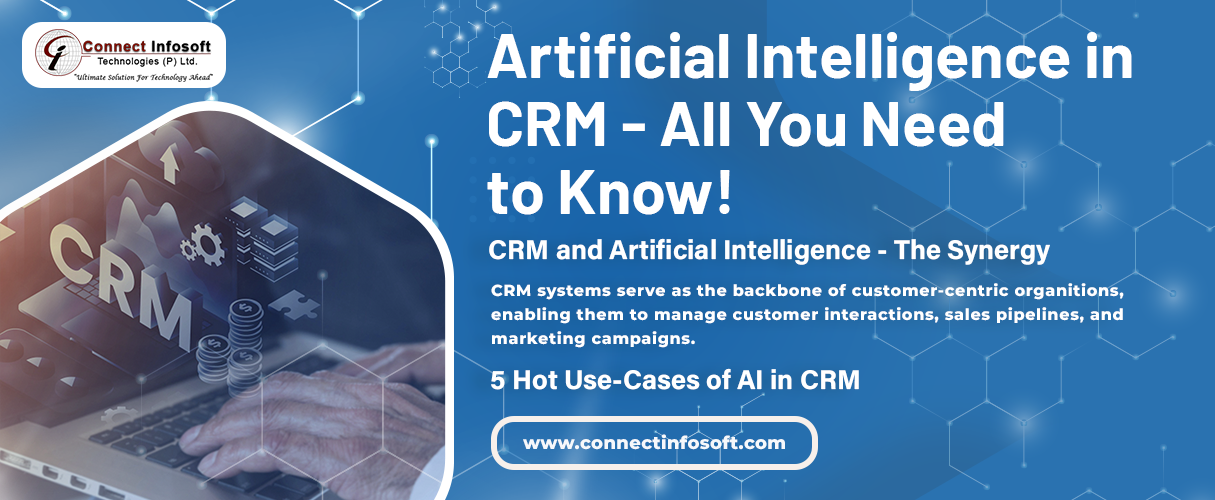Artificial Intelligence in CRM - All You Need to Know!

Artificial intelligence (AI) has transformed many industries, including Customer Relationship Management (CRM). AI-powered CRM systems offer advanced capabilities that enhance customer interactions, streamline processes, and drive business growth.
CRM and Artificial Intelligence - The Synergy
CRM systems serve as the backbone of customer-centric organizations, enabling them to manage customer interactions, sales pipelines, and marketing campaigns. When integrated with AI technologies, CRM becomes even more powerful. AI enhances CRM by analyzing vast amounts of customer data, automating tasks, and providing intelligent insights that drive better decision-making. The synergy between CRM and AI empowers businesses to deliver personalized experiences, improve customer satisfaction, and drive revenue growth.
CRM Intelligence Success Stories
Numerous organizations have witnessed remarkable success by leveraging AI in CRM. For instance, companies like Amazon and Netflix utilize AI algorithms to analyze customer preferences and behavior, enabling them to offer personalized recommendations. This enhanced customer experience leads to increased sales and customer loyalty.
Furthermore, Salesforce, a leading CRM provider, has incorporated AI capabilities into its platform. Salesforce Einstein, their AI-powered assistant, helps sales teams by providing predictive lead scoring, intelligent opportunity insights, and automated email nurturing. This integration has resulted in improved sales productivity, higher win rates, and enhanced customer engagement.
5 Hot Use-Cases of AI in CRM
1. Identify Repeating Patterns in Customers' Purchase Behavior
AI algorithms can analyze customer data to identify patterns and trends in purchasing behavior. This insight helps businesses tailor their marketing strategies and offers to target specific customer segments effectively.
2. Smart Customer Segmentation for Hyper-Personalized Outreach
AI-powered CRM systems can segment customers based on various attributes such as demographics, preferences, and past interactions. This enables businesses to deliver hyper-personalized marketing campaigns, resulting in higher customer engagement and conversion rates.
3. Transforming the Sales Funnel
AI can optimize the sales process by automating routine tasks, such as lead qualification, data entry, and follow-up reminders. This frees up sales teams to focus on building relationships and closing deals, leading to increased sales efficiency and revenue generation.
4. Virtual Assistance
AI-powered virtual assistants, such as chatbots, provide instant and personalized customer support. They can handle routine inquiries, provide product recommendations, and assist with order processing, ensuring round-the-clock customer service while reducing the workload on support teams.
5. Prevent Customer Churn & Increase Engagement
AI algorithms can analyze customer behavior, sentiment, and usage patterns to identify signals of potential churn. This enables businesses to take proactive measures, such as targeted retention campaigns or personalized offers, to prevent customer attrition and increase engagement.
What Does AI Do Better Than Your Manual Workforce?
AI surpasses manual workforce in several areas, bringing unique advantages to CRM processes. Here are some key areas where AI excels:
1. Data Processing and Analysis: AI algorithms can process and analyze vast amounts of customer data at an unprecedented speed. They can identify patterns, correlations, and insights that may be challenging or time-consuming for humans to uncover manually.
2. Predictive Analytics: AI can leverage historical data to make accurate predictions about customer behavior, sales trends, and future outcomes. This empowers businesses to make data-driven decisions and anticipate customer needs, resulting in improved sales forecasting and marketing strategies.
3. Personalization at Scale: AI enables businesses to deliver personalized experiences to a large customer base. By analyzing individual preferences, behavior, and historical data, AI can tailor product recommendations, marketing messages, and offers on a one-to-one level, driving higher customer engagement and satisfaction.
4. Automation of Routine operations: AI-powered automation can handle repetitive and time-consuming operations like data entry, lead qualification, and follow-up notifications. This allows sales and support teams to focus on high-value activities, such as building relationships and providing personalized customer experiences.
5. Real-time Insights and Decision-making: AI algorithms can process data in real-time, providing instant insights and recommendations. This empowers sales teams to make informed decisions, respond quickly to customer inquiries, and seize opportunities in a fast-paced business environment.
Conclusion:
Artificial Intelligence has transformed the CRM landscape, enabling businesses to leverage vast amounts of customer data, automate processes, and deliver personalized experiences. The synergy between CRM and AI offers immense opportunities for growth, increased efficiency, and improved customer satisfaction. By embracing AI-powered CRM systems and leveraging its capabilities, organizations can unlock valuable insights, optimize sales and marketing efforts, and stay ahead in the competitive business landscape.


